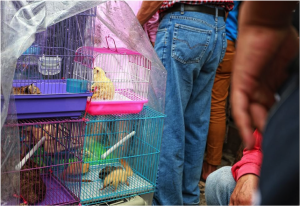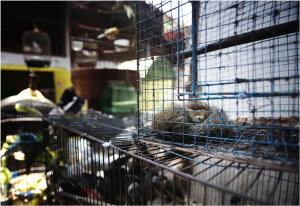Market Survey

The LFP team travelled to one of Java’s big cities this week to go undercover and carry out a market survey. We posed as completely naive tourists in order to browse the stalls without attracting any attention that might put us in danger. From the moment we pulled into the dusty market place we got into character “oohing” and “ahhing at the “adorable” animals. Cage upon cage of mistreated and distressed animals stared back at us as we wandered about the narrow alleyways. Animals both domestic and exotic crammed into grotty dirty cages, most no larger than your average hamster cage. We didn’t see any primates for sale but were assured by our guide that on other days they are openly for sale on the market. The stakes are a little higher now though because sellers are more conscious of the conservation status of Slow Lorises.
Despite not seeing any lorises the day we went to the market we came face to face with many other residents of the forests where our own lovely lorises live. From one particularly dirty cage a Civet cat stared up at us with huge sad eyes, it was absolutely heart wrenching. We then spotted another cage further back and were mortified to see that it contained several baby civets pressed together. The seller proudly told our guide that they were wild caught very recently. We doubted they would survive very long having been separated from their mother at such a young age. Fruit bats huddled in a shaded corner of one cage which had been left out under the baking hot sun. Elsewhere, one owl seemed to have had no choice but to grow around its cage. Its wings pinned above its back and its head hung near its feet – completely defeated. Sugar gliders are a new craze here and we saw very many for sale throughout the day.
Many of you will never experience the horror show that is an animal market; the sounds of the rainforest and the smell of a rubbish dump in the high summer. Almost all the animals we saw displayed behavioural abnormalities, but what else would you expect? They really are in hell under a hot tin roof.
Sadly, the traditional Indonesian animal markets aren’t the only place you can purchase an exotic pet. Even the glitzy Mall had exotic animals for sale outside its grand entrance. Several sellers had set up cages containing a range of animals for shoppers to haggle for. They even had a kitten Leopard cat wearing a pink ribbon! Despite the cages being much cleaner than those found in market place it’s still incredibly distressing to see exotic animals being sold so freely. At this rate there’ll be no wildlife left in Java’s forests. They’re all for sale at the nearest animal market!
Meanwhile in Cipaganti, Tahini has had us running around in a blind panic since her signal recently disappeared from her usual stomping grounds near Mommy Tereh. After several days of playing the “We no find Tahini” game, Denise and Adin set out on an epic quest across the land in search of the lost loris. They succeeded and found Tahini on extended vacation in an area of forest near Kepala Desa’s (village chief) office on the other side of the village! Playboy Azka led his observers on a wild goose chase around the forest before finally settling on a favourite hotspot for gum trees. Here he hung upside down gnawing away happily for nearly two hours, stopping periodically to survey his surroundings. Another loris who spent a great deal of time hanging out this week was Charlie. She was seen catching moths for over an hour whilst suspended by her feet from a bamboo branch. Lorises are such incredible acrobats!
Last week when out observing slow loris Charlie who was moving out and about all over the forest, we nearly stepped on a civet trap. We have never seen a civet trap before. We deactivated it and went back the next day. For the next few days, it was still there and we went round to deactivate it. Though not aimed at lorises, lorises often walk the path and could easily get caught in the trap. We decided to focus our week’s education efforts on civets. Monday morning we split the LFP team into smaller subgroups. Charlotte and Aconk went to talk to the farmers and provide information about the work that LFP does and the importance of civets to the local ecosystem. Pak Dendi and Josie went around looking for traps and thankfully didn’t find any more. All traces of the other track had been removed as well. Remaining team members Denise and Adin went on a mission to find missing loris Tahini. The overall feedback was extremely positive. People seemed really happy to hear about civets and like the civets being on their farms. Thankfully none of the farmers around our field site had set up the trap to catch civets.
Slow Loris Movie Night
On Saturday night it was the final of the Cipaganti football tournament. LFP decided to take the opportunity to hold an educational slow loris movie night. We showed the movie “Don’t Let Me Vanish” on the big screen. Before and after the movie questionnaires were handed out to assess the usefulness of such movie nights. We hoped to educate especially adults and farmers, as well as children, on the importance of lorises to the ecosystem and their endangered status due to the wildlife trade. People were so excited to watch a movie on the big screen. Afterwards we showed some other movies about Cipaganti, the Loris Pride Days and even an amateur Halloween movie featuring the LFP team. The latter was met with fits of laughter and ended the evening on a high.

Diorama – can you spot the loris?
For our weekly school visit this week we figured we’d have the children get creative. We brought 7 boxes with us and a bag full of leaves, twigs, and branches from the forest. What did we have planned? We wanted them to make night time forest dioramas. We split the class into groups and showed them an example that volunteer Charlotte had made in a tea box. We hung up pictures of a loris, a civet and an owl and asked that each group draw and place at least one of each of these animals in their boxes. It was a scramble to the forest bag as soon as they discovered it and each group made a great box featuring the animals, starry night skies and plants. At the end of the session head tracker Dendi went round each group with a headtorch with red filter and shone the light into the boxes. At the same time he explained the work that LFP does in the forest when we go out at night. He told the children about the harming effects of using white light to the eyes of the animals. It was a lovely way to connect the work we do outside the school sessions with the activity and at the end of the class some of the children asked when we were returning.
Nature Club
Last week volunteers Charlotte and Josie took the nature club outside with head tracker Pak Dendi. There is a beautiful stream with a backdrop of the Papandayan volcano near the project house and that was their class’ destination. They took with them a stack of folded paper and coloured pencils. The idea was to draw the stream and the volcano onto a postcard. Greetings from Cipaganti. The children were very excited and got stuck in. Not only did they decorate the front of the card, but some children also wrote messages on the inside and one memorable one said that the child had never been happier than with the arrival of the Little Fireface Project.






